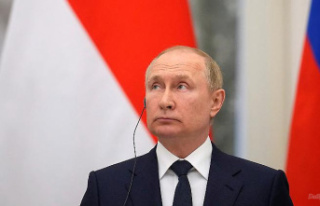The 9-euro ticket is such a great success that discussions about a sequel are in full swing. The transport companies want the ticket after August at a significantly higher price, but the Ministry of Transport is not jumping for joy. The motto is: wait and see.
The Ministry of Transport has reacted cautiously to a proposal from the industry to introduce a permanent 69-euro ticket to replace the 9-euro ticket. A spokesman for department head Volker Wissing said there was an agreed procedure, according to which the results of a federal and state working group on the future and financing of local public transport should be available in autumn.
The Association of German Transport Companies (VDV) had spoken out in favor of a permanent 69-euro ticket that should be valid nationwide for public transport. The 9-euro ticket expires at the end of August. "Based on the premise that the public transport tariffs of the transport associations will continue to be attractive for the majority of passengers, we propose a nationwide public transport system for those who have proven to be a relevant target group in market research - drivers who are willing to pay climate ticket for 69 euros per month as a single 2nd class travel entitlement," said VDV General Manager Oliver Wolff. For comparison: A monthly ticket from the Berliner Verkehrsbetriebe for the inner city area costs about 60 euros in the cheapest case - and without a 9-euro ticket.
Unlike the €9 ticket, the €69 ticket would not automatically apply to subscribers. "The industry is able to offer such a climate ticket from September 1st," explained Wolff. "To do this, however, we needed the corresponding order from politicians very quickly." Wolff put the costs for such an offer at around two billion euros a year. For this year, these costs could still be financed through the rescue package for transport companies negotiated with politicians. "A new regulation is needed for the new year."
The transport policy spokesman for the Greens in the Bundestag, Stefan Gelbhaar, told the German Press Agency that it was good that the discussion was progressing. "It is now the turn of the Ministry of Transport to put a concrete proposal on the table, combined with a plausible financing proposal. Then a decision can be made quickly." The FDP politician Wissing had made it clear several times that he first wanted to talk about reforms in local transport and then about financing issues. The organization of public transport is up to the states.
SPD parliamentary group leader Detlef Müller also called for a successor plan in an interview with the editorial network Germany. "Whether a connection ticket then costs 39, 49 or 69 euros is secondary," he said. "But it has to be in a context that has a psychological effect and is worthwhile for people to leave their cars at home." In the "Stuttgarter Zeitung" and the "Stuttgarter Nachrichten", the honorary chairman of the Pro Bahn passenger association, Karl-Peter Naumann, called for the expansion of the offer in addition to cheaper day tickets. "You cannot revolutionize the world with tariff measures alone."
Meanwhile, the Pro-Rail Alliance advocated the VDV’s proposal. "That's the right approach," wrote association manager Dirk Flege on Twitter. "A flat rate for local transport throughout Germany. Important: immediately after the 9-euro ticket and discounted social tickets are included." The Mofair association, in which Deutsche Bahn's competitors in particular are organized, made a similar statement to Naumann on Twitter. There must not only be a cheap ticket, but also a good infrastructure.
With the 9-euro ticket, passengers can use public transport throughout Germany for 9 euros a month. The three-month campaign is intended to relieve the burden on citizens. On the other hand, switching to buses and trains should become more attractive.












